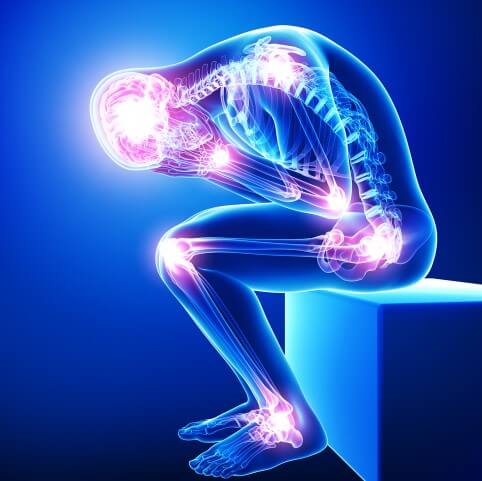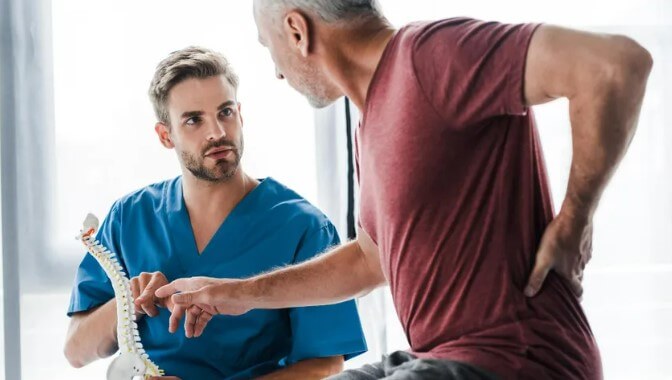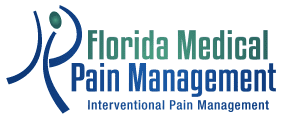
Pain Management Tips: By Doctor FMPM
Living with chronic back pain can be challenging, but there are various strategies you can incorporate into your daily life to manage and alleviate your symptoms. This blog provides a comprehensive guide to pain management, offering valuable tips to improve your quality of life and find relief.
Lifestyle Changes for Pain Management
Utilize Cold and Heat Therapy
Cold and heat therapy is an effective way to manage pain and inflammation. You can relieve different types of pain by alternating between cold and hot packs.
Cold packs are useful for reducing swelling and relieving pain. Cold therapy can minimize inflammation and pain when applied to a discomforted area. It is particularly beneficial for acute injuries such as sprains, strains, or swelling caused by overexertion. Cold packs are available in drugstores or can be made at home using gel packs or ice cubes.
Heat therapy, on the other hand, is great for soothing joints and muscles. Apply heat to the affected area to increase blood flow and relax the muscles. Heat therapy is particularly beneficial for chronic pain conditions like arthritis or muscle spasms. Heating pads, hot towels, or hot water bottles can be used for heat therapy. To prevent skin damage or burns, maintain a warm temperature without it being too hot.
Eliminate Drugs and Alcohol
One of our pain management tips is to eliminate alcohol and drugs from your daily life to effectively manage pain. These substances can negatively impact the body’s healing process, making it harder to find pain relief. Smoking can worsen pain, damage tissues, and reduce circulation. Alcohol consumption can also worsen sleep disorders, resulting in increased pain and discomfort.
By removing these substances from your life, you create a healthier environment that allows your body to heal more quickly and better manage pain. If you are struggling to overcome substance dependency and create a pain-free life, it is important to seek help.
Regular Exercise
Regular exercise can be a powerful way to manage pain. Exercise releases endorphins, which are natural pain-relieving and anti-inflammatory substances. These endorphins act as natural pain blockers and help relieve discomfort. Regular physical activity improves blood circulation, delivering essential nutrients and oxygen to the muscles and joints, promoting healing and reducing pain. Exercise also reduces stress, which can increase pain sensitivity.
Before starting or changing any exercise program, consult your doctor to ensure it is safe and appropriate for you. Exercise can prevent further injury by improving flexibility and strengthening muscles.

SCHEDULE A CONSULTATION
Experience a pain-free life! Call us at (727) 268-0172
Embrace Relaxation Techniques
Stress can increase pain sensitivity and contribute to a negative mentality, intensifying the pain experience. Relaxation techniques such as meditation, mindfulness, deep breathing exercises, and engaging in activities that bring joy and peace can calm the mind and reduce pain. Self-care and stress reduction are essential to effective pain management and improve your quality of life.
Optimize Your Diet
Another pain management tips is nourishing your body with nutrients is crucial for your health. A healthy diet rich in fruits, vegetables, whole grains, lean proteins, and healthy fats is essential for daily well-being and pain management. These foods are rich in nutrients and support a healthy immune system, reduce inflammation, and promote tissue healing.
Maintaining a healthy body weight can also reduce pain and the risks of chronic diseases associated with obesity. Making conscious choices about what you eat will improve your quality of life and reduce pain.
Enjoy the Benefits of Massage
Massages are known for their ability to relieve physical pain and mental strain. They are a great way to reduce muscle tension, increase circulation, and relax the body. Massages provide numerous pain-relieving benefits by relaxing the mind and body. They not only provide fast pain relief but also promote calmness, reduce stress levels, and improve overall well-being.
Use Medication to Treat Pain
If lifestyle changes and physical therapy do not effectively manage your pain, it may be necessary to consult your physician. Your physician may prescribe medication to help manage your pain. The following are commonly prescribed medications for chronic pain management:
- Potent pain medications
- Nonsteroidal anti-inflammatory drugs
- Antidepressants
- Anticonvulsants
- Muscle relaxants
- Topical medications
Speak to a physician affiliated with the NSPC today if you believe you might benefit from these medications.

SCHEDULE A CONSULTATION
Experience a pain-free life! Call us at (727) 268-0172
Surgery for Pain Management
If your pain is not controlled by lifestyle changes or medications, your doctor may recommend surgery. There are various surgical procedures available to manage pain, depending on your specific condition. Examples include spinal fusions, discectomies, joint replacements, decompression surgeries, and nerve blockades. These procedures aim to eliminate or reduce pain symptoms, address the underlying cause of pain, and restore function.
It is important to have an open and honest discussion with your healthcare provider about the benefits, risks, potential side effects, and expectations of surgery for pain management. Your circumstances, medical history, and goals will be considered to determine whether surgery is the best option for you. They can even give you tips about pain management.
In addition to lifestyle changes, medication, and surgery, there are several alternative therapies that can complement your pain management efforts.
- Acupuncture: Acupuncture is an ancient Chinese practice that involves inserting thin needles into specific points on the body. It is believed to stimulate the flow of energy and promote healing. Many people find acupuncture helpful in relieving pain, particularly chronic pain conditions like arthritis, migraines, and fibromyalgia. However, it’s important to consult a licensed and experienced acupuncturist for safe and effective treatment.
- Chiropractic Care: Chiropractic care focuses on the musculoskeletal system, particularly the spine. Chiropractors use manual adjustments and manipulations to improve spinal alignment, reduce pain, and enhance the body’s natural healing abilities. This therapy is commonly used for back pain, neck pain, and joint pain. It’s crucial to seek treatment from a qualified and licensed chiropractor.
- Physical Therapy: Physical therapy involves exercises, stretches, and manual techniques to improve strength, flexibility, and mobility. A physical therapist can create a personalized treatment plan to target specific areas of pain and help you regain functionality. Physical therapy is beneficial for various conditions, including musculoskeletal injuries, chronic pain, and post-surgical rehabilitation.
- Mind-Body Techniques: Practices like yoga, tai chi, and meditation combine physical movement, breathing exercises, and mindfulness to promote relaxation, reduce stress, and alleviate pain. These techniques can improve flexibility, strengthen muscles, and enhance overall well-being. Incorporating mind-body techniques into your daily routine can have a positive impact on pain management.
- Herbal Remedies: Some herbal supplements and botanical extracts have been used for centuries to manage pain and inflammation. Examples include turmeric, ginger, devil’s claw, and willow bark. However, it’s important to consult with a healthcare professional or herbalist before using any herbal remedies, as they may interact with medications or have potential side effects.
- Cognitive-Behavioral Therapy (CBT): CBT is a therapeutic approach that focuses on changing negative thoughts and behaviors associated with pain. It helps individuals develop coping strategies, relaxation techniques, and problem-solving skills to better manage their pain. CBT can be particularly useful for chronic pain conditions by addressing the emotional and psychological aspects of pain.
Remember, while alternative therapies can provide additional support for pain management, it’s essential to consult with your healthcare provider before trying any new treatment. They can offer guidance and ensure compatibility with your overall pain management plan.

SCHEDULE A CONSULTATION
Experience a pain-free life! Call us at (727) 268-0172
Support and Education
Living with chronic pain can be physically and emotionally challenging. Seeking support from others who understand your experience can be beneficial. Support groups, both in-person and online, provide an opportunity to connect with individuals facing similar challenges, share experiences, and gain valuable insights and coping strategies.
Additionally, educating yourself about your specific condition and pain management techniques can empower you to make informed decisions about your health. Stay up-to-date with the latest research, treatment options, and self-care practices related to your pain condition. Knowledge is a powerful tool in effectively managing pain.
Conclusion
Managing chronic pain requires a multifaceted approach that combines lifestyle changes, medical interventions, and alternative therapies. By implementing the tips and strategies outlined in this comprehensive pain management guide, you can enhance your quality of life, reduce pain, and regain control over your well-being.
Remember, each person’s pain management journey is unique, and what works for one individual may not work for another. It’s important to work closely with your healthcare team to develop a personalized plan that addresses your specific needs and goals. Together, you can find the most effective combination of strategies to manage your chronic pain and improve your overall quality of life.
Book a Consultation
Are you tired of living with persistent pain that hinders your daily activities? Seek relief now with expert guidance from FMPM! Learn practical and proven pain management techniques directly from a seasoned professional who specializes in Florida Medical Pain Management. Unlock the secrets to alleviating discomfort, improving mobility, and enhancing your overall quality of life.
Don’t let pain hold you back any longer – take charge of your well-being today! Contact us today to access life-changing pain management tips from FMPM!
Our Treatment Services
Florida Medical Pain Management’s top priority is to serve our patient’s needs and create long-lasting relationships with them. Our treatments include:
- Treatment for Neuropathy
- Arthritis Management
- Back Pain Medication
- Chronic Pain Treatments
- PRP Injections
- Epidural Injection
- Regenerative Medicine
- Hip Pain Medication
- Ketamine Infusion Therapy
We want to help patients live more fulfilling and productive lives by effectively managing their pain. Florida Medical Pain Management also provides home therapy and many more. Click here to see our other services.















